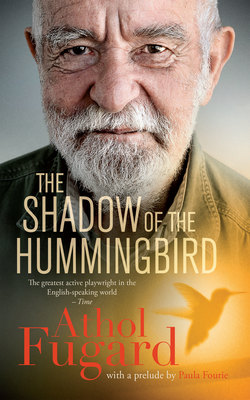Читать книгу The Shadow of the Hummingbird - Athol Fugard - Страница 5
Foreword to the Play
ОглавлениеAthol Fugard
One day in 2010, in the little study in Southern California where I used to write, I saw the shadow of a hummingbird on the wall opposite my desk. It didn’t take me long to realise that the bird in question was visiting and drinking deeply from the nectar feeder on the small patio outside. The particular angle of the sun that day, and for the following few days, had thrown the bird’s shadow on my wall. Although I could not see the feeder, nor the “real bird” from my armchair, I became fascinated with the dark smudge that hovered and shot away even as I focused on it. For about a week, I would sit there waiting for it. It was during that period of tense expectancy that I realised consciously for the first time that I had had a long fascination with shadows – both the word and the phenomenon. I had in fact ended a much earlier play – Exits and Entrances – with an entry from one of my very early notebooks in which I had explored this fascination. It is the very same entry that Paula has chosen as Oupa’s focus in the Prelude. That period, during which I sat riveted by the shadow on the wall, coincided with the realisation that it was time to reckon with, perhaps more nakedly and autobiographically than ever before, the only creative energy I have ever brought to my work – love. The immediate focus of my love was my grandson, Gavyn, then six years old. These disparate elements came together in the play I now call The Shadow of the Hummingbird. It is the second, and probably the last of my plays set in America.
As this play is already in a sense based on my relationship with my grandson, Paula’s opening scene, which interlaces newly written monologues with material taken from three decades of notebooks, further confuses my life and my work. As Paula often points out – Oupa is not Athol Fugard, and yet he is. That is also part of the reason I decided to play the role myself. The Prelude made exploring the role of Oupa a very complex emotional experience. Paula’s selection from the unpublished notebooks is uncompromising. I never once attempted to censor her, even though this resulted in me exposing some very private moments in real time. I might have been more comfortable with a reader quietly encountering these entries on their own in a published text, rather than out of my own mouth in a situation where I was already exposing myself as an actor. This became possible because Oupa was, in effect, a fig leaf that hid my nakedness.
The first version of this play was staged at the Long Wharf Theatre in New Haven, Connecticut. The role of Boba (Gavyn) was played by two wonderful ten-year-old twins, Aidan and Dermot McMillan, who alternated in performances. This was a critically important stage in the journey of the play to the South African version, which I now consider the final one. Despite its enthusiastic reception in the USA, I had nonetheless realised that there were still areas in the play that could be opened up. Having Paula in the rehearsal room, this time not only as co-writer but also as co-director, offered us the opportunity to take our collaboration even further than before. In this, we had the benefit of our South African Boba, Marviantoz Baker, a young actor who invited us to age Boba so that his presence in the text was more substantial than before. This included Paula writing Boba’s story, “The Predicament of Percy the Dragon”, and also contributing one of her own disturbing notebook entries to the main portion of the play. In trying to capture exactly what we had on stage during the South African production, we have decided to publish this version of the play with perhaps more detailed stage directions than I would normally think necessary. The simple reason for this is that I wanted to define this particular staging as distinct from what had come before.
This play is dedicated to Gavyn Fugard Scranton, now eleven years old.
